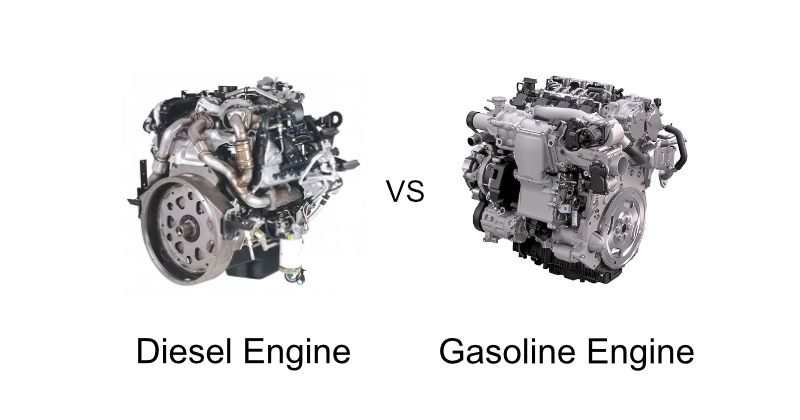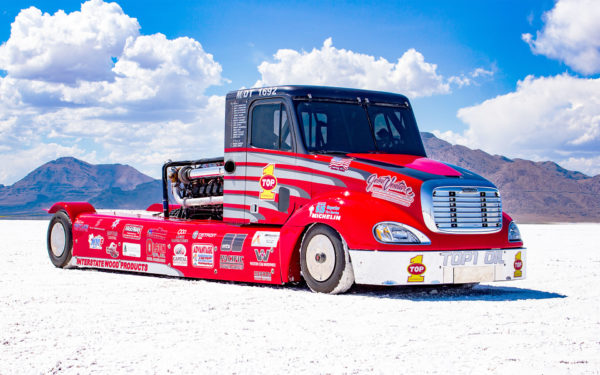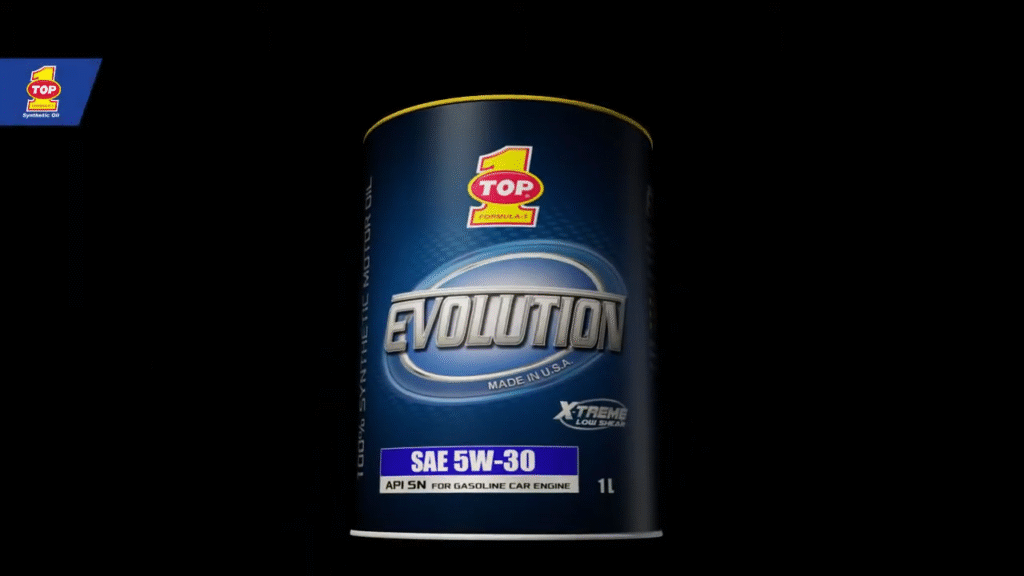When it comes to engine maintenance, few things are more important than choosing the correct engine oil. With so many options on the shelf — and so many acronyms on the labels — it’s easy to get confused.
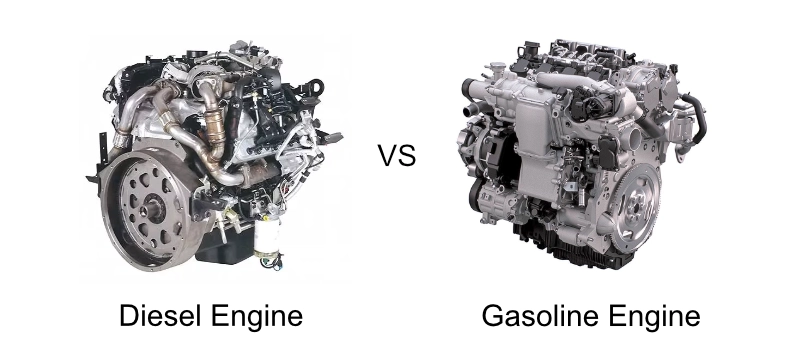
One of the most common questions is:
“Can I use diesel engine oil (HD oil) in my gasoline car engine (PCMO)?”
The short answer is:
No — it’s generally not recommended.
While diesel oil can sometimes be used in older gasoline engines built before the mid-1990s, using it in modern gasoline engines can cause premature wear, poor performance, catalytic converter damage, and even complete engine failure.
Here’s everything you need to know to make the right choice.
Why Diesel Oil Doesn’t Belong in Modern Gasoline Engines
Diesel and gasoline engines are designed to operate in very different ways:
- Diesel engines run on compression ignition and operate under higher pressures and temperatures.
- Gasoline engines use spark ignition and operate at lower pressures and temperatures.
As a result, the engine oils made for each type are formulated differently:
| Feature | Diesel Engine Oil | Gasoline Engine Oil |
| API Rating | “C” categories (CJ-4, CK-4, FA-4) | “S” categories (SN, SP) |
| ZDDP (Zinc/Phosphorus) | Higher (more anti-wear protection) | Lower (protects emissions systems) |
| Detergents & Dispersants | Higher (to handle soot & contaminants) | Lower (to maintain oil films) |
| Typical Viscosity | Thicker (e.g., 15W-40) | Thinner (e.g., 5W-30, 0W-20) |
Using diesel oil in a modern gas engine can:
- Wash away protective oil films
- Damage catalytic converters over time
- Make cold starts harder (especially in winter)
- Void your car’s warranty
How to Choose the Right Engine Oil
Choosing the right oil is about more than just picking a viscosity or brand. Here’s what really matters:
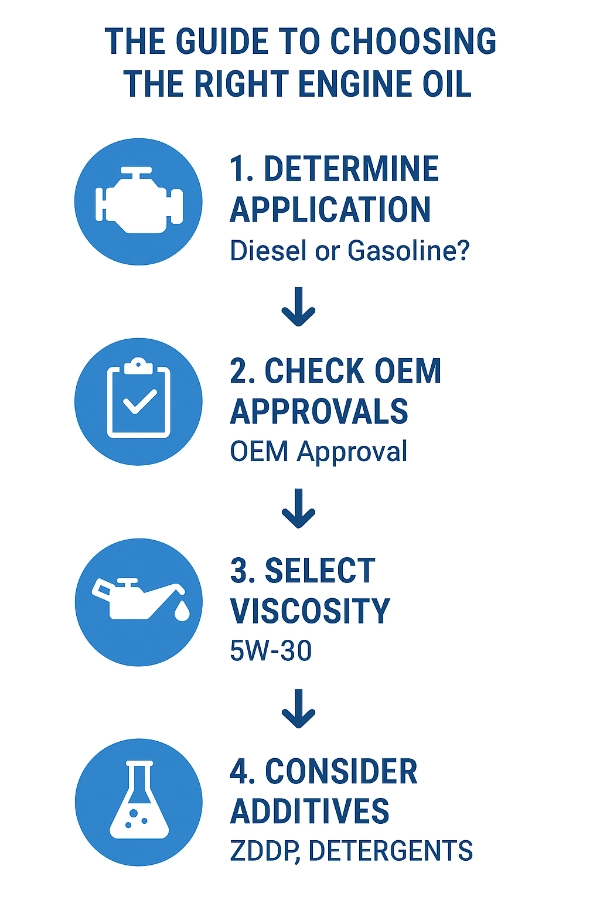
1. Start with the Engine Type (Application)
Ask yourself:
- Is your engine diesel or gasoline?
- Is it a passenger car, a heavy-duty truck, or a high-performance/racing engine?
This should always be your first filter when selecting oil.
2. Look for OEM Approvals
OEM stands for Original Equipment Manufacturer.
Automakers often publish specific oil requirements (e.g., VW 502.00, GM Dexos1, Ford WSS-M2C945-A).
Always:
- Check your owner’s manual or the OEM website
- Use oils that have your car’s specific approvals
- Keep receipts and service records to protect your warranty
3. Check the API/ACEA Classification
API = American Petroleum Institute.
It rates oils by their intended use:
- “S” = Spark ignition (gasoline engines)
- “C” = Compression ignition (diesel engines)
Never use an oil with only a “C” rating in a gasoline engine.
If you must use diesel oil in an older gas engine, it should be dual-rated (“C” and “S”).
4. Choose the Right Viscosity
Once you know the correct oil type and approval, choose a viscosity that suits your climate and OEM specifications:
- Lower numbers before the “W” (e.g., 0W, 5W) = better cold start flow
- Higher numbers after the “W” (e.g., 30, 40) = better high-temperature protection
Example:
- Gasoline: 5W-30 or 0W-20
- Diesel: 15W-40 or 5W-40 (cold weather)
5. Understand Key Additives
ZDDP (Zinc DialkylDithioPhosphate)
- Essential for wear protection
- High levels are great for older engines and diesel
- Too much can damage catalytic converters in modern gas engines
Detergents & Dispersants
- Diesel oils contain more (to handle soot and combustion byproducts)
- In gas engines, too many detergents can strip protective oil films
The Exception: Older Gasoline Engines
In older gasoline engines (pre-mid-1990s) with flat-tappet camshafts or looser tolerances, diesel oil can sometimes be used safely — and even provide extra wear protection thanks to its higher ZDDP content.
However, be cautious:
- Only use diesel oils that also have an API “S” rating
- Match the viscosity to your climate and OEM recommendation
- Be aware it can still shorten the life of catalytic converters
- Consider periodic oil analysis if using long-term
Key Takeaways
- Diesel oil is not recommended for modern gasoline engines — it can cause wear, emissions issues, and void warranties.
- Always pick oil based on engine type, OEM approval, API rating, and correct viscosity.
- If you’re unsure, check your owner’s manual or talk to a trusted mechanic before switching oil types.
Choosing the right oil may seem complicated, but it’s one of the simplest and most cost-effective ways to protect your engine and keep your car running smoothly for years to come.




